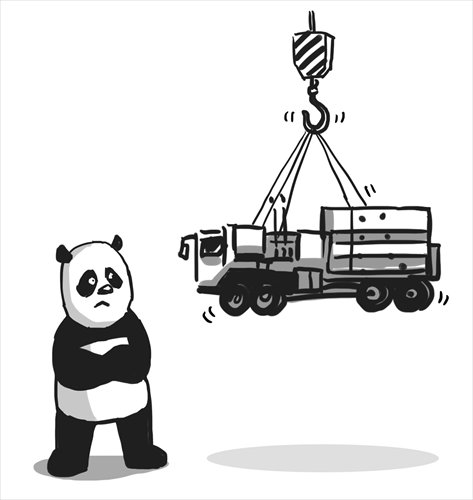


Illustration: Liu Rui/GT
After weighing possible gains and losses, South Korea submitted its application for a founding membership in the Asian Infrastructure Investment Bank (AIIB) on Thursday. This decision is not a surprise to the public both in South Korea and elsewhere. Meanwhile, US Defense Chief Ashton Carter is reportedly going to visit South Korea in early spring. It is very likely that he will negotiate with Seoul about the deployment of Terminal High Altitude Area Defense (THAAD), an anti-ballistic missile defense system led by the US. But the country is divided over this issue.
The installation of THAAD on South Korean soil has raised great controversies at home. Conservatives believe that the issue concerns South Korea's national security, and as a loyal ally, Seoul must cooperate with Washington on this matter in a joint bid to contain North Korea. In addition, they say that opposition from neighboring countries, such as China, shouldn't hamper the process or even force Seoul to change its mind. In the eyes of South Korea, China and North Korea are in the same camp with regard to security issues.
Diplomats and academics believe that China's biggest concern is that, by means of the defense system, US, South Korea and Japan would turn into a triple alliance against China. They think THAAD will probably have an unpredictably negative impact on Beijing-Seoul relations.
As a matter of fact, in the long-standing China-US geopolitical rivalry, South Korea has been caught in the middle. It is the weak link in the Washington-Tokyo-Seoul alliance, and it has become harder for it to reap profits by virtue of balanced diplomacy in the face of China-US competition.
There are prudent opinions. Even though China and Russia's stance is excluded from the decision-making process, South Korea needs to consider two preconditions before making any choice: whether the nuclear threat from North Korea is exaggerated, and whether THAAD can effectively defend South Korea from the North's attack.
There is a more constructive scenario that can help South Korea out of the current dilemma: Seoul develops its own missile defense system, and acquires technological assistance from the US if needed. Without US leadership in this case, South Korea can minimize the repercussions caused by THAAD to its relations with China and Russia.
The logic behind the THAAD issue is that, if North Korea keeps its hardline policy toward the South and the nuclear crisis in the region continues to escalate to the state that major powers including China, Russia and the US cannot keep a rein on North Korea, South Korea will have no choice but to deploy THAAD on its soil, and the US will also need to display the capability of THAAD and its ability to safeguard Seoul. But before this logic is proved, there is no need for Seoul to make a decision.
Some South Koreans think Seoul is able to take the AIIB and THAAD at the same time to show South Korea's cooperativeness with both China and the US. In this way, Seoul might think it remains pragmatic because it can rely on the US in security issues and China in economic development. Despite the fact that the US doesn't want its ally to join the AIIB and China doesn't want to be surrounded by a missile defense system, South Korea has to make a choice anyway. But do the AIIB and THAAD have the same implications?
A hot debate about THAAD is still going on in South Korea and those who take a discreet stance have gained the upper hand. The Blue House has not yet made its decision, but Carter will surely deliver a serious note from the White House to ask South Korea to cooperate.
China and Russia have taken a firm stand against the US National Missile Defense program for years not just for fear of greatly reducing their own defense capabilities, but also out of concern that the world order might be jeopardized, which might set off a new arms race. If this happens, it would be a drastic setback for arms control and disarmament.
South Korea only has two options - yes or no. But it will be extremely hard to make a decision. Seoul won't put the South Korea-US alliance at risk, nor would it neglect China's regional advantages in the region. THAAD might reinforce South Korea's national defense, but whether the benefits are worth the costs is still unknown.
The Korean Peninsula is still shadowed by nuclear issues. When Carter visits Seoul in a few days, he is unlikely to get a timetable concerning THAAD from Seoul.
The author is director of the Department of International Political Science, College of Political Science and Public Management, Yanbian University. opinion@globaltimes.com.cn
 J-11 fighters in air exercise
J-11 fighters in air exercise Beauties dancing on the rings
Beauties dancing on the rings Attendants-to-be join Mr. & Miss Campus Contest
Attendants-to-be join Mr. & Miss Campus Contest Beijing's toughest anti-smoking law takes effect
Beijing's toughest anti-smoking law takes effect Family lives in cave for about 50 years in SW China
Family lives in cave for about 50 years in SW China PLA soldiers operating vehicle-mounted guns in drill
PLA soldiers operating vehicle-mounted guns in drill Blind carpenter in E China's Jiangxi
Blind carpenter in E China's Jiangxi China hosts overseas disaster relief exercise for the first time
China hosts overseas disaster relief exercise for the first time 20 pairs of twins who will become flight attendants in Sichuan
20 pairs of twins who will become flight attendants in Sichuan Obama is sowing discontent in S.China Sea
Obama is sowing discontent in S.China Sea Rescuers work through night to reach cruise ship survivors
Rescuers work through night to reach cruise ship survivors Driving through limbo
Driving through limbo Facing down MERS
Facing down MERSDay|Week